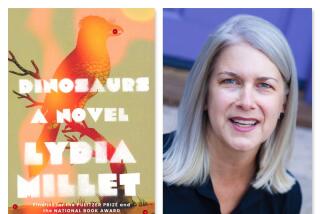BOOK REVIEW : Enchanting Tale of Anguish and Illness : THE DINOSAUR MAN, Tales of Madness and Enchantment From the Back Ward, <i> by Susan Baur</i> . HarperCollins. $19.95, 201 pages
- Share via
The Dinosaur Man of the title is a 56-year-old schizophrenic on Ward 9-2-D of a mental hospital somewhere in Massachusetts. Susan Baur, who met him while studying severely disturbed patients for her doctorate in psychology, gives him the pseudonym “Mr. Nouvelle.”
“Routinely described by clinicians as the craziest human being they had ever met,” Baur writes, Mr. Nouvelle “had spent his entire adult life in the back ward.” Among his delusions is his belief that he is a dinosaur who has sex orgies with women who have cantaloupes between their legs and breasts like zucchinis. His fantasies were “like the rich interleafing of a pornographic novel and a poultry breeder’s manual.”
Like most of the patients in these tales, the Dinosaur Man is a Northeasterner, raised as a Catholic in a troubled home, who suffers a tremendous need to love and be loved.
Occasionally this need was filled by a clinician remembered felicitously as Dr. Sweetheart. Dallas Grey, a seriously depressed patient prone to sadistic delusions, told Baur about the wonderful doctor who could fly. Detective work on Baur’s part turned up a real psychiatrist, who many years earlier had cared deeply for patients. Grey had transformed the memory of Dr. Sweetheart into a superman whom he could occasionally conjure up when his tortuous delusions threatened to overwhelm him.
Baur recalls that the treatment of acute mental illness has gone through many phases and that today “terrible mothers, the devil and masturbation--have been left behind.” Instead of “the old cures of long-term therapy, exorcism and farm labor,” Baur writes, the treatment of choice today is chemical. Baur reminds us, nevertheless, that drugs are no panacea: “For a sizable minority, drugs do no more than subdue their feelings and help them sleep.”
Baur attributes her own ability to communicate with patients on the back ward to curiosity. “Ridiculous as it may sound, my interest in patients’ delusions was a matter of habit. When someone leaned toward me and said, ‘Once my mother turned herself into a bee with compound eyes as large as plates,’ I automatically stopped whatever I was doing and listened, just as I had done as a child.”
But Baur is a listener to be reckoned with. She enters into the fantasies of her patients as a critic, evaluating them on artistic merit. One woman’s mythology, for instance, is dismissed as mediocre: “Her stories overpowered but did not beguile”; she lacked “the elasticity of mind and the wit to dazzle and bemuse as did the dinosaur man.”
The dinosaur man is her touchstone. Two years after completing her research, Baur returned to Ward 9-2-D. When she reunited with “Mr. Nouvelle,” she discovered that he had incorporated her into his delusions, remembering her as his “dinosaur daughter.”
Baur is moved by his mental sleight-of-hand, his creative manipulation of memory. “I now believe that without realizing it, all of us revise our past whenever we change our present and that this dual process is at the center of therapy and of ordinary development as well. I further believe that one MUST change both the past and the present, for the two work reciprocally on each other in deeper ways than are commonly realized.”
Baur illustrates this dynamic with the case of a woman about to be released from the ward. Although the woman had refused to leave two years ago, she was claiming that she always had wanted to be released. The woman was not lying, Baur points out; rather, she was doing what most of us do in small increments all the time: reworking the past to suit the present.
There is certainly no dearth today of first-person accounts of intriguing medical cases. But this one is particularly distinguished by lyrical prose, by an appreciation that no single cure exists for the mentally ill and by the realization that enchantment cohabits with anguish among the denizens of the Back Ward.
Next: Jonathan Kirsch reviews “Mary Diana Dods, a Gentleman and a Scholar” by Betty T. Bennett (William Morrow) .
More to Read
Sign up for our Book Club newsletter
Get the latest news, events and more from the Los Angeles Times Book Club, and help us get L.A. reading and talking.
You may occasionally receive promotional content from the Los Angeles Times.










